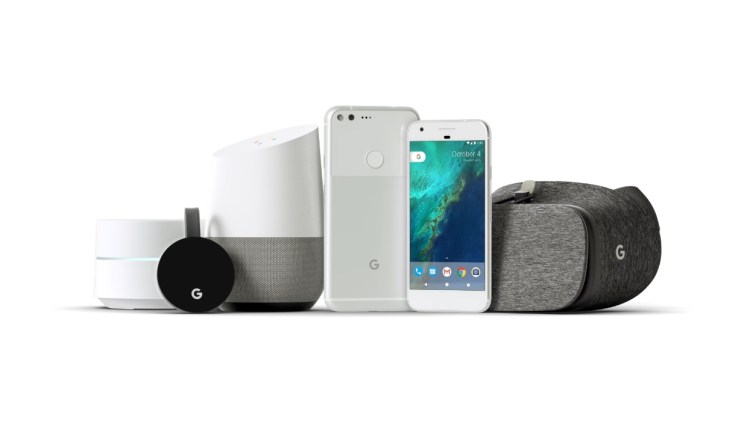Much of the immediate reaction to the Made by Google event yesterday is focused on the host of new hardware: the premium Pixel phone, the affordable Chromecast Ultra, the colorful Google Home, the soft Daydream View VR headset, the sleek Google Wi-Fi router. That’s as it should be, since it was a hardware product unveiling.
While all these things looked pretty, it was also obvious that every item is essentially just a Google-branded replication of some existing item available from some other company. Google isn’t generally known to be in the gadget knockoff business, so what gives?
Google Assistant
Earlier this year, I posited that Google’s teaser presentation of Google Assistant at I/O signaled a lot more than just a new competitor to Siri or Alexa. Google has always been a company that traffics in information. It collects and consumes and profits from data. It owns search. Google Assistant is the newest mechanism for collecting and consuming (and ultimately profiting from) that data, and all this lovely hardware is simply another means to fuel the process.
As Google CEO Sundar Pichai noted himself, “no matter where you are or what you’re doing, you can have the best of Google by your side” in what is increasingly an AI-first world “where computing becomes universally available — be it at home, at work, in the car, or on the go — and interacting with all of these surfaces becomes much more natural and intuitive.”
So the Made by Google event wasn’t just about gadgets, it was a showcase of Google’s long-term story and its continued prowess in devising new and reliable ways to capture search. The shape of that search is also intriguing.
Google is showing that it wants to evolve to a much more personalized search experience. OK Google already set the bar regarding interactive expectations for search, so Assistant extends that vocal relationship. What is interesting to me is that, as humans, everything we do touches the search for information. From our friends, our colleagues, our family, and even our enemies. Every question we ask is a search, and every action we take is on something that matches a search. Some searches are fast and internal, like telling my brain to find the “f-a-s-t” keys so I can type them. Some searches are much more involved and outward, when the owner of the information is external to the self and unknown or we don’t quite know how to shape the question. (The Hitchhiker’s Guide to the Galaxy elegantly shows us the challenge: The answer is 42, but what is the question?)
Google has placed itself at the center of this very elemental human pursuit — within the sound of our voice, on the ready to answer our search questions. But the nature of Assistant also shows that Google is growing less concerned with our public, Internet-curated world of information. Instead, the focus will be directed inward. The “search of us” is about to evolve. Where we go, with whom, and when. Our calendars, our correspondence, our activities, our stuff — and all the other stuff that is personal to others who are personal to us. This is the information of interest to Assistant. By design, the more personal information Assistant has, the better it will be able to serve you. And the more Assistant-equipped gadgets you possess, the greater the information Assistant can collect through a “natural conversation between you and Google.”
Life is conversational — and Google cannot wait for you to start talking.
Jim Hunter is chief scientist and technology evangelist at Greenwave Systems, an international Internet of things (IoT) software provider and services integrator partnering with Verizon, TCP, NXP, IBM, E.On, and others. He has created and patented several technologies in the smart, connected space and founded/sold two companies (to Motorola Mobility/Google) prior to joining Greenwave. Prior to the advent of the connected home, Jim served in the US Navy as a nuclear engineer and nuclear certified instructor. Follow him on Twitter: @theiotguru.
VentureBeat's mission is to be a digital town square for technical decision-makers to gain knowledge about transformative enterprise technology and transact. Learn More

